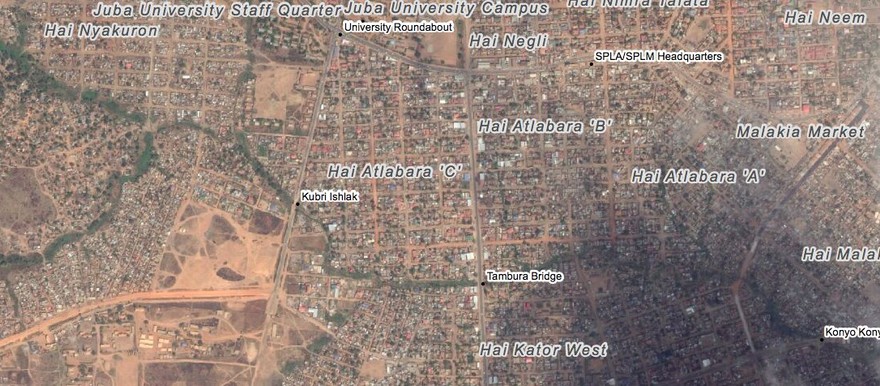At least six civilians were shot dead in both accidental and targeted killings in the South Sudanese capital during fighting at Giyada barracks today, according to local residents.
Fighting at the barracks started on Wednesday morning after a dispute over pay involving senior army officers and soldiers who had been living at the Nuer-inhabited IDP camps in Juba, which are protected by the UN.
The soldiers who had not been serving over the last two months sought anyway to retrieve their pay but were supposedly told that they were removed from the pay list, possibly on the basis that they were considered absent without leave.
Giyada, which is Arabic for ‘headquarters,’ refers to the SPLA base near Juba University in the southwest of the city. It was the scene of fierce clashes in mid-December.
Three civilians were shot dead by soldiers in the Nyakuron residential neighborhood today, not far Giyada, according to a woman who lived in the same compound as the victims.
She said that two uniformed men with guns came to the compound today demanding ‘Where are the Nuer living here?’
An Ethiopian man also living there replied to the soldiers that the Nuer residents were not at home, saying they had gone away two days ago. They accused the man of lying and immediately shot him dead.
According to the same source, the two gunmen then proceeded into the house, located two Nuer men, and shot them dead.
Other residents of Nyakuron neighborhood reported a separate incident in which three civilians were accidentally killed. They said two Ugandans and one South Sudanese were hit by bullets in the Jabarona market area, also near Giyada.
The number of combatants killed in the day’s events was not yet clear. Ambulances were seen moving throughout the city. A witness saw at the gates of Giyada six dead bodies. Sources who had been in the base put the total number far higher.
Photo: An aerial view of Juba showing various neighborhoods. The Giyada barracks are visible south of the ‘Kubri Ishlak’, near the bottom left corner of the image (OCHA)




